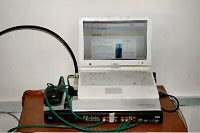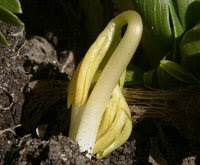 it was a strange shape, and its colour was unlike any rock he'd seen before.
it was a strange shape, and its colour was unlike any rock he'd seen before.He spat on it and rubbed it with his finger, then took it over to the brook and washed it. This was something special, he was was going to keep it. He slipped it into his leather pouch.
He thought about the fire. It had been fiercely hot where the wind had blown through a gap in the hearthstones, he'd noticed that last night. Fires were usually orange in the centre, this one had been a bright yellow, almost too bright to look at and much too hot to get close. Perhaps the extreme heat had somehow created this object? What else had been different?
Science or technology? -
What's going on in this little story? When is something science? When is it technology? What's the difference? Does it matter? There's popular confusion about these two words, not helped by the fact that some of our most respected sources are as confused as the general public.
But there's a perfectly clear difference between the two and it's really not hard to explain. We don't even need a scientist or a technologist to help us nail this one; a good place to start would be a dictionary. The Wiktionary definition offers two current meanings for the word 'science'.
1 - The collective discipline of study or learning acquired through the scientific method; the sum of knowledge gained from such methods and discipline.
2 - A particular discipline or branch of learning, especially one dealing with measurable or systematic principles rather than intuition or natural ability.
For technology, Wiktionary gives
1 - ... the study of or a collection of techniques.
2 - ... a particular technological concept - the body of tools and other implements produced by a given society.
We can see right away that science is to do with knowledge whereas technology is concerned with techniques. The difference is that science seeks to understand what is while technology has a purpose and wants to make use of what is.
Two things immediately follow from this. There can be no technology without prior science, and technological advance usually opens fresh opportunities for science.
Making a discovery - Let's take another look at our little story. During the Late Stone Age (the Neolithic) somebody must have noticed that a shiny material was left behind in the ashes of last night's fire. This is science, initially it's just a matter of observing what happens. Maybe copper had been accidentally extracted from pieces of ore many times before but very little attention had been paid to it. Only a particularly inquiring mind would notice and begin to wonder.
What if? - The next step is to test the possible causes for what we have observed. This is a scientific experiment. The man who found the special pebble might try to create a hot fire deliberately by altering the layout of the stones and the amount and kind of wood. He might play around with different kinds of stone. He might discover that he could make a fire hotter by rearranging things. He might also find the heavy, lustrous material only appeared when a very hot fire was combined with a particular kind of hearthstone. By trial and error and keen observation he might become quite proficient at producing copper.
Finding out how things work is science, using the knowledge to make copper on demand is technology. It would be worth making because people always like unusual objects, he'd be able to trade lumps of this stuff for food, stone tools, and other things he needed.
Science is a matter of observing, making hopeful guesses, testing ideas, and narrowing down the truth by ruling things out. Technology is a matter of seeing the value of something and finding practical ways of achieving it. Science may lead to new technology, and technology may lead to new industry. And existing technologies and industries may enable further scientific progress.
Long before copper was first extracted by fire, technologies based on wood, stone, skin, fibre, bone and other materials were well advanced. Homes could be built from mammoth tusks or branches cut from trees, the frames covered with sods of earth or foliage. Baskets, woven fabrics, and simple pottery were used for practical purposes and for decoration. And hunter-gatherer technology was well advanced with good strategies for finding edible roots, fruits, shellfish along with bows, stone-tipped arrows and spears and more.
Why does it matter? - We often say 'science and technology' in a single breath without thinking about the difference. Studying sub-atomic particles is science so we're tempted to think that a particle accelerator is science too. But the accelerator is technology. Because astronomy is a science we think that the Hubble Space telescope is also science, but it's not.
This confusion becomes a problem when we oppose science because we are anxious about technology. Science informs us about the universe in which we live, technology makes changes that often affect us in practical ways. It is never harmful to understand something, but it may be harmful to make use of it. The internal combustion engine is a great example. Understanding combustion, the expansion of gases, or the structural strength of materials does not in itself do either harm or good. But the technology of an engine can be used to power an armoured vehicle or an ambulance. It can be used to make war, deliver a car-bomb, or rescue a sick person. And as we all know it may also have unexpected side effects such as causing global warming, city smogs, and respiratory diseases.
We will all agree that a certain level of effort is useful, without science and technology we would still be living without clothes, without houses, without fire, and without medicine.
But blaming science for issues with technology is counterproductive. It's not what we know that gets us into trouble, it's what we do with what we know. But it's also true that our current technology has done untold harm. It has enabled unsustainable growth of population and comsumption of resources, we are now between a rock and a hard place.
The main issues with science are deciding how much of it we can afford and where to focus the funds and effort. There are also some regulatory issues, science depends on experimentation and experiments may raise moral issues. We sometimes disagree over what is acceptable.
The main issues with technology are how it will be used and how it will affect society and our environment. Meanwhile, neither science nor technology can address the great questions of purpose. Why are we here? Why is the universe here? What is the purpose of love? Moral issues, questions of right and wrong, value judgements, all of these must be handled in some other way.
Questions:
- Your home is full of the results of technology. Can you identify some of them?
- Can you make any guesses as to the kind of science that underpins those technologies?
See also:
- How does science work? - Journeys of heart and mind




